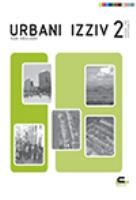Is the private rented sector desirable in Slovenia? Examining the role of the state in the development of the sector
Is the private rented sector desirable in Slovenia? Examining the role of the state in the development of the sector
Author(s): Richard SendiSubject(s): Economy, Rural and urban sociology
Published by: Urbanistični inštitut Republike Slovenije
Keywords: private rented sector; tenure structure; housing policy; enabling principle; state institutions; Slovenia
Summary/Abstract: The private rented sector (PRS) in Slovenia has operated since the end of the Second World War without being officially recognised and supported by government policy. This article explores why the responsible state institutions have persistently ignored this sector. The discussion starts with a brief review of the development of the country’s housing policy, which has been deeply entrenched in the “enabling approach” philosophy since the major housing reforms were introduced in the early 1990s. With the help of the findings of a survey conducted among the key state institutions responsible for housing care, the role of the state is examined in the development of the private rented sector since a market economy system was adopted in Slovenia in 1991. Although the responses received from the survey show that the state institutions investigated are generally aware of all the shortcomings of the current PRS, they have made no serious attempt to support its development. A suggestion is therefore made in the conclusion that the failure to introduce the measures necessary to support the development and formal operation of the PRS may be attributed to unfavourable attitudes of policymakers toward the sector.
Journal: Urbani izziv
- Issue Year: 27/2016
- Issue No: 2
- Page Range: 112-124
- Page Count: 13
- Language: English

